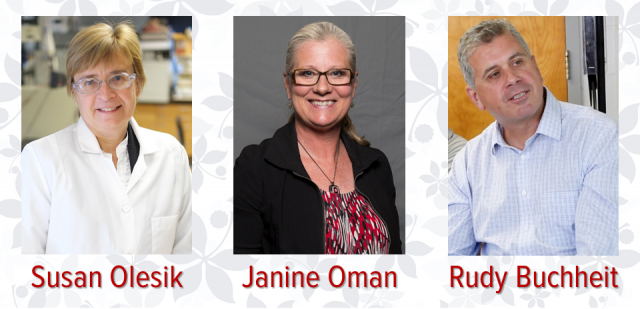
Three receive The Women's Place mentoring award
The Department of Athletics, Department of Chemistry and Biochemistry and Associate Dean Rudy Buchheit received The Women's Place inaugural exemplary mentoring awards.

At the 2018 Annual Women's Reception, The Women’s Place (TWP) awarded Janine Oman, senior associate athletic director for Student Services and Sport Administration and senior woman administrator, and Susan Olesik, professor and chair of the Department of Chemistry and Biochemistry, Exemplary Mentoring Program Awards for the mentoring programs they created and facilitate in their units. TWP also awarded Rudy Buchheit, associate dean of Academic Affairs and Administration in College of Engineering Administration & Planning, an Outstanding Peer Mentor Award.
This is the first year The Women’s Place has given out the mentor awards. TWP created the award after the President and Provost's Council on Women's inventory of Ohio State's mentoring initiatives found that there is significant room for improvement in this area. To that end, the goal of the mentoring awards is to recognize the considerable efforts and accomplishments of departments and individuals who are consistently applying the best practice of formal and/or informal mentoring. In addition, this is a step to help cultivate an environment where women and underrepresented groups can thrive by encouraging a culture of mentoring at the university.
Susan Olesik is convinced that mentoring is important for recruitment, retention and advancement. She initiated a mentoring program in her department in 2012.
“It generates an inclusive culture in the department, which is really important,” Olesik said. “Faculty feel, and it's real, that we want them to be part of the team, and we're going to help make sure that they advance. It’s one of the reasons why we have managed to get such outstanding assistant professors, they know they're going to be supported.”
Every new assistant professor is assigned a mentoring committee, a team of three senior faculty members who review the professors’ grant proposals, suggest awards they should be nominated for, help them get symposia talks at national meetings, and generally advocate for them. The mentoring continues once faculty are promoted from assistant to associate, at which point they have one mentor to help them advance.
Olesik credits the mentoring program for helping junior faculty succeed. “Almost all of our assistant professors have major national awards and major grants, which is not common,” she said. And junior faculty seem to agree that the mentoring program is working, “When the assistant professors have gotten major awards, I've been very pleased to see that they profusely thank their mentoring committee for helping them out!”
For staff, an exemplary program is the Athletics Department’s informal female coach mentoring events. With women comprising only about thirty percent of staff, women coaches created a forum in which they could support each other.
Janine Oman facilitates this program and supports the women’s participation in the Alliance of Women Coaches’ and other professional networks. For this group, a social environment where they could learn from more experienced women coaches, network, create relationships and discuss common issues was the solution instead of one-on-one mentoring.
“The benefits we have realized from this informal program have been twofold: it has created an environment to allow conversations to occur and provided connections within the women’s coaching community,” Oman said.
Rudy Buchheit is one of the advocate coordinators in the Advocates and Allies for Equity initiative, which focuses on improving the climate and culture for women and underrepresented groups by creating a peer mentoring network, educating men about implicit bias, male privilege and gender equity issues, and preparing them for active allyship.
Over the past three years, Buchheit has lead and help create the Advocates and Allies peer mentorship model for diversity and inclusion that emphasizes continued personal growth through regular Advocate meetings, ongoing education, and consultations with the Advocates and Allies Advisory Council. Building this supportive network of peers allows Advocates to address the questions and challenges related to equity with the courage necessary to contribute substantively to culture change.
With demonstrated benefits as evidenced by research, successful programs, and testimonials, implementing additional mentorship programs at the university could impact institutional climate by generating a more inclusive, collaborative environment in which underrepresented staff and faculty receive guidance and support to help them advance and thrive. TWP encourages departments and units across the university to learn more about these exemplary programs and consider adapting their models.